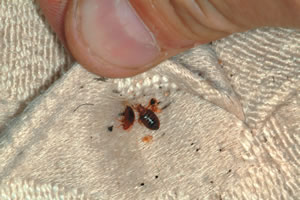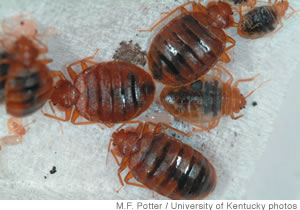Do Not Let The Bed Bugs Bite
Bloodsucking bed bugs are making life unpleasant for Hawaii humans, and experts expect the problem to worsen

By .(JavaScript must be enabled to view this email address)
E-mail this story | Print this page | Archive | RSS

|
Bloodsucking bed bugs are making life unpleasant for Hawaii humans, and experts expect the problem to worsen
Dear Editor: Thanks a lot for the creepy assignment on bed bugs. Why me, sir? Have I slid so low on the editorial seniority pole that no one else will report on insects? Or perhaps you think because I wrote that story on undercover cops that I have a nose for news and can detect parasites in hidden places.
Well, after talking to a number of the town’s experts about nasty bed bugs, there apparently is a crisis of epidemic proportions. They expect it to get worse.
So, OK, I’ll bite and take the assignment, even if I can’t stop scratching and squirming, for some reason.
Based on a recent sighting of bed bugs at the University of Hawaii dorms and pending litigation by a tourist against a Waikiki hotel for alleged suffering, this is a serious subject with widespread public interest. Hawaii pest control firms and the state Department of Health are being inundated with calls.
Evidently these blood-sucking nocturnal creatures are bugging the heck out of us, and even UH entomologists who study insects are only scratching the surface of the issue.
Just when we thought we only had termites, cockroaches and mosquitoes to contend with, now bed bugs have moved into the neighborhood.
Public awareness and education are essential to coping with the situation. So we asked local pest control experts to share some insight about these critters.
Peter Oshiro, supervisor of the state Dept. of Health-Sanitation Branch, describes the Common Bed Bug (Cimex lectularius) as a small wingless insect about 3/8 inch but large enough to easily be seen by the human eye. It is oval in shape and flattened in appearance.
Bed bugs are nocturnal - they love the night life - but may feed during the day in areas with reduced lighting such as theaters and restaurants.
They hide in cracks, crevices, bed frames, under pictures hanging on walls, under dresser drawers and other places out of the light.

|
Bed bugs don’t fly or move fast but they have an uncanny sense for human scent, body heat and CO2, or carbon dioxide. Blood is essential to their life cycle.
“Even though bed bugs feed on humans,” Oshiro says, “they are not known to vector any diseases to humans. So other than itchy bite sites, they are currently of little medical importance.”
Mostly, they are a nuisance.
We’ve lived with bed bugs for thousands of years, and only recently, because of pesticide bans and the insect’s adaptive abilities, the little critters are making a comeback.
J. Kenneth Grace, Ph.D., entomologist and special research director at the UH College of Tropical Agriculture and Human Resources-Plant and Environmental Protection Sciences, says, “Up until the 1930s people lived with bed bugs. They were not that uncommon. Then DDT was developed.”
The synthetic pesticide was very effective in reducing the bed bug population. But in 1972, due to public outcry against pesticides’ cancer-causing and environmental pollution effects, a ban was imposed in the U.S.
Also over the years, he explains, bugs have built a resistance to man-made formulas.
“Eighty percent of registered insecticide products for bed bugs don’t work due to the high level of resistance,” Dr. Grace says. “It’s difficult to handle the situation yourself. Call a professional.”
“Bed bugs, like many insect species, originated in the tropics. Hawaii is an ideal environment for them. We get 15 new insects introduced here every year,” the researcher says.
They’re great travelers too, hitchhiking to places on the backs and suitcases of other tourists.
Tim Lyons, executive director of the Hawaii Pest Control Association, says condo property managers, hospital administrators and group-living personnel all want to take pro-active steps to address bed bug infestation.
Early detection and repeat-
Page 1 of 2 pages for this story 1 2 >
E-mail this story | Print this page | Comments (0) | Archive | RSS
Most Recent Comment(s):








